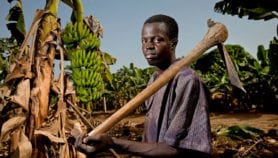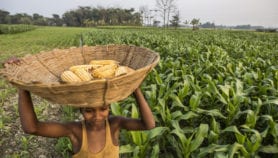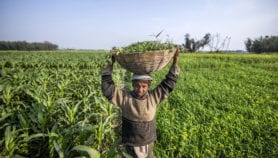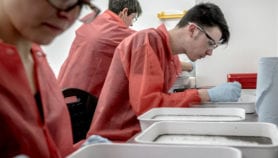By: Tamar Kahn
Send to a friend
The details you provide on this page will not be used to send unsolicited email, and will not be sold to a 3rd party. See privacy policy.
[CAPE TOWN] African leaders are considering a proposal to set up a continent-wide advisory panel on biotechnology to help them address difficult political decisions about genetically modified (GM) crops.
The panel is being proposed by the secretariat of the New Partnership for Africa’s Development (NEPAD) in response to a call from African leaders and agricultural ministers at the recent African Union summit to develop an African strategy on biotechnology and biosafety.
The summit, which was held in Maputo, Mozambique, was attended by the heads of state of about 40 of the 53 member nations.
The creation of such a panel, which would also be charged with facilitating trade in GM products between African countries by harmonising biosafety regulations, is expected to be formally endorsed by the NEPAD steering committee within the next two months.
John Mugabe, science and technology advisor to NEPAD and a key architect of the proposed panel, says that it is important for African leaders to be able to make up their own minds on what is best for the continent.
He points out that the controversy last year over the inclusion of GM maize in food aid offered by the United States to various southern African countries illustrates the extent to which Africa has become the victim of a fight between Europe and the United States over GM crops.
The United States is pushing hard for adoption of the controversial technology, which it says can help improve food security in Africa.
In contrast, the European Parliament has passed stringent new labelling and traceability laws for food and animal feed with genetically engineered ingredients, and accuses the United States of using Africa’s food needs as a political lever to try to persuade Europe to relax its position.
Last year’s controversy highlighted the difficulties faced by African governments in making an independent assessment of the advantages and disadvantages of GM crops.
Zambia, which decided to reject the US offer of food aid because of concern about the GM maize, recently launched a US$40 million National Biosafety and Biotechnology Strategy Plan, which aims to strengthen its ability to assess the benefits and potential dangers of such crops.
According to Mugabe, the advisory panel would draw on the work of what he describes as knowledge-based organisations, and therefore make recommendations to African leaders based on “evidence, not perceptions”.
He says that the panel, whose creation still has to be formally approved by the NEPAD steering committee, would be made up of a small inter-disciplinary team of scientists, civil society representatives, industrial managers and senior policy makers.
Jocelyn Webster, director of the pro-biotech industry body AfricaBio, welcomed the plans for an advisory panel, saying it would enable African countries to help each other to assess the risks and benefits that advances in biotechnology might offer farmers and consumers.
She also said it was important for African countries to ensure they did not create inadvertent barriers to trade between them by introducing widely divergent biosafety requirements. “There are huge potential markets within Africa, which we need to focus on, rather than just looking towards European markets,” she said.
But Glenn Ashton, spokesman for the anti-GM lobby group Safeage, which is campaigning for a five-year moratorium on GM products, was more sceptical. He said the organisation would be watching the composition of the panel very closely, in the hope that it would not be comprised exclusively of pro-biotech industry representatives.
Tamar Kahn is the Science Correspondent for Business Day.













